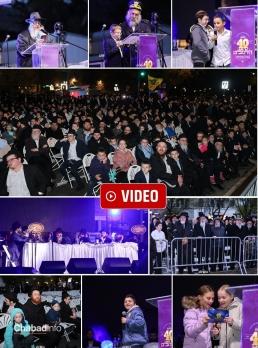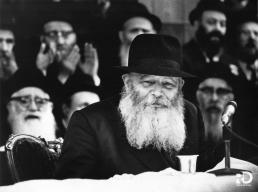The Maccabees of Crown Heights
Fifty-eight years ago, the Crown Heights community faced a terrifying crime wave. In response, R’ Shmuel Schrage founded the “Maccabee Community Patrol” which restored peace and quiet to the streets of the neighborhood • A look back at the events of those days, based on articles in local and international press and on personal interviews • By the Beis Moshiach Magazine • Full Article
Crown Heights has been in the news lately, and not for good reasons, since Jewish residents have been attacked by passersby. The series of attacks has generated great concern among the leaders of the community.
In response, the Community Council announced a defensive tactic in which the members of Shmira divided the community into ten zones with people in charge of each zone, ready to respond immediately to any report of any act or threat against someone in the community. After a complaint is received by the police, it is immediately transferred to Shmira who arrive immediately, locate the attacker and hold him until the police come. They also liaise between those who are attacked and police investigators gathering evidence.
Beis Moshiach took a trip in a time machine to the days when the Shmira organization was founded. At first, it was called the Maccabees. The Israeli papers took a great interest in it and reported in amazement about a special protective organization devoted to the security of the Jewish residents.
The organization had three names. Officially, it was called “Igud Crown Heights,” but the members of the organization called themselves “ ” (Yiddish for self-defense, which is what independent Jewish defensive organizations were called starting with the Russian Revolution in 1905). The residents of Crown Heights called the organization the Maccabees.
THE FOUNDING OF THE MACCABEES
It all began in Iyar 5724/April 1964, when a large group of black youths entered a Chabad yeshiva in Crown Heights and began to beat the students. The Israeli press reported at the time:
Screaming that “you don’t belong in this country,” a group of black youths attacked yeshiva students in New York. Following the attack, the New York police department were out and keeping a sharp eye on the building of the Chassidic Lubavitcher Yeshiva, where a day earlier, a crowd of black youths, boys and girls, carried out the attack during class hours. A number of students and two of the staff were injured. They were shouting antisemitic slogans, such as “you don’t belong in this country” and “we will chase you out of New York,” as they beat the school children.
Visitors of all faiths, black and white, came to visit the yeshiva to tell the administrators and students that this was a “painful” occurrence. R’ Shmuel Schrage of the yeshiva administration, issued a statement saying that the attack “was absolutely antisemitic, but not organized.”
In the wake of this criminal act as well as other acts of violence committed by black residents of the neighborhood, R’ Shmuel Schrage, decided to launch the “Maccabees” organization, and this too was reported in detail in the Israeli press:
The Chassidim living in Crown Heights in Brooklyn, have established a “self-defense force.” Cars equipped with two-way radios patrol the streets to prevent attacks against Jews.
The religious residents of Crown Heights organized these patrols, in order to guarantee the safety of the community members from harassment by local thugs. About one hundred volunteers, all in their twenties, dressed in their “kapotas” and broad brimmed hats, have joined these patrols. The organization was given the name Maccabees.
The group has to its name four cars equipped with two-way radios, which maintain constant contact with the base of operations. The cars are meant to patrol the streets of the “Chassidic quarter,” from sundown to sunrise. Each car is assigned four men who will be unarmed, but in the case of an event will contact the police.
The group leader is Rabbi Shmuel Schrage, 28 years old. R’ Schrage is the principal of the yeshiva of the Lubavitcher Chassidim, who reside in the besieged area. On Friday nights, the cars will be manned by non-Jews, and as of this point, twelve non-Jewish plus eight black community members have volunteered for the job.
The article cited here goes on to offer some background information as to what led to the creation of this volunteer force:
It is already a few weeks since the neighborhood residents have been living under a self-imposed nighttime curfew, after a series of attacks against the Chassidim by black youths. Now the residents will be given the telephone number of the base, so they can mobilize the necessary assistance in the case of another disturbance.
***
Another report cited that the fear of the Crown Heights residents reached a peak after the wife of a rabbi was severely attacked. It goes on to quote Jewish community leaders as saying that there were five night crimes committed in the two months prior, including muggings, looting of stores and serious assaults.
It also cites a somewhat evasive statement from an NYPD spokesman, about how the increase in crime is consistent with that of other areas, and that the police would be assigning additional manpower and stepping up patrols.
In another article, it describes the role of the Maccabees as making themselves available to see people home safely.
“THIS DEFENSIVE ORGANIZATION PUTS US BACK 100 YEARS”
The founding of the organization did not pass quietly and it engendered mixed reactions. On the one hand, the police began to get the message that they had to investigate the situation in Crown Heights; on the other hand, the non-Jewish residents of the neighborhood did not like the organization and they complained about what they considered a vigilante group which might not be legal.
Reports from that time mention that the founding of a “Lubavitch self-defense organization” called the Maccabees elicited promises on the part of law enforcement to investigate the situation, as well as condemnation from black leaders against the “irresponsible behavior” of the Jewish community leaders.
One city council member, chairman of the standing committee on New York City affairs, announced that “this matter of establishing such an organization sets us back a century.” However, he did add that the investigation was not for the purpose of undermining the organization, but to determine the causes leading to its establishment.
There were actually also complaints from among Lubavitchers in Crown Heights. When R’ Shmuel Schrage reported this to the Rebbe, the Rebbe said: Don’t retreat; on the contrary, strengthen the activities.
This answer was unequivocal but R’ Shmuel refused to publicize it. When the attacks against him increased, his wife begged him to publicize the Rebbe’s answer but he said, “I will not involve the Rebbe in matters of olam ha’zeh (this world).”
SHOCKING MURDER UNDER THE NOSES OF SHOMRIM
It seems the message did not get through to the criminals in the community, for even after the forming of the defensive organization, serious attacks were perpetrated on the streets of Crown Heights, the most shocking of which was the murder of a Jewish teacher (albeit later discovered to have been committed not by a local resident, and who apparently did not target Jews specifically). To Lubavitcher Chassidim in Crown Heights, the message was clear: Not to listen to the complaints against the Maccabees and not to disband.
This is what was reported in the Israeli media (Maariv):
Leaders of the Jewish community in Crown Heights, Brooklyn, will be meeting tomorrow with Chief of Police Michael J. Murphy, two discuss ways to coordinate the inclusion of the self-defense organization as an auxiliary in assisting the police.
The newspaper HaBoker reported at length about the murder and reactions:
“A 38 year old Jewish woman, Miss Charlotte Lipsik, was brutally murdered on Friday night in Brooklyn.”
HaBoker added that Miss Lipsik was found seriously wounded in the building in which she lived with her handicapped mother. She was taken to a hospital where she died a few hours later. The police opened an investigation of this murder case.
“In light of recent developments in Brooklyn, the urder should be seen in a racist context, in light of the heightened tensions between the blacks and Chassidim living in the area.”
The newspapers repeated and emphasized the crimes that had a race-based component and expressed sorrow that the police were not displaying enough force to put a stop to these overt displays of antisemitism. At the same time, the newspapers were critical that things had reached such a point that citizens found it necessary to start their own citizen defense force.
One of the questions that preoccupied the residents of Crown Heights at the time was, where were the Maccabees when the murder occurred?
This question was raised in HaBoker:
“The murder of the teacher has only served to exacerbate the situation. The murder took place Friday night, when the independent defensive organization, the Maccabees is off-duty. The incident occurred a short way away from the organization’s headquarters. Its leaders declared that now they are thinking less than ever about disbanding the organization and are even considering expanding it. They added that this would continue to be their position until the police begin to provide adequate means for the protection of the residents of Brooklyn.
“Despite these reports, the impression given is that the police have decided to go all out to find the murderer or murderers of Charlotte Lipsik. The Chief of Detectives of the NYPD, Phillip Walsh, has taken the personal lead on the investigation, and is being assisted by a staff of fifty detectives.”
As mentioned, the Maccabees were not on duty that night. There was only one patrol on the streets manned by volunteers. They were members of the Episcopalian church with their leader. They were from the West Indies and had black activists along with them. Over Shabbos, they patrolled the neighborhood but apparently, this wasn’t enough, for the murder took place under their noses.
THE LEADERS: SCHRAGE AND TELESHEVSKY
The media storm that resulted led to many American media outlets doing stories on the Maccabees group, the defenders of the peace in the neighborhood of the Lubavitcher Rebbe, that looked out for the safety of the residents in the face of increasing violence..
In addition to numerous reports in the U.S., the Israeli press kept reporting every few days about the dramatic developments. In an article by reporter Shimon Baker in Maariv, in which he tells about the Maccabees and those active in it who were officially called “Igud Crown Heights,” he describes his visit to the base of operations. He quotes R’ Shmuel Schrage as saying, “The weapons used by our people include a flashlight, a whistle and the book of Tehillim.” He writes that R’ Shmuel was born in Brazil and came to the United States in 1949, in order to learn in the yeshiva of Lubavitch, and now found himself in the news because of self-defense work in response to the attack on the yeshiva.
He goes on to say:
When I visited the headquarters of the “self-defense” organization, which already has over two hundred volunteers, I caught a brief conversation with another leader of the defenders, who refused to divulge his name. I was later told that this Jew, a middle aged man with a black beard, endangered his life many times for Jews and Judaism back in the USSR, and was well versed in protecting Jewish dignity and working to save Jews under the most difficult conditions.
The third person in the “troika” is a tall thin man, also with a beard, whose name is Moshe Teleshevsky. He serves as a cantor in a synagogue in Flatbush. Obviously, he is also a Chabad Chassid.
***
Further in the same article, he discusses how other Jews see the situation and the political pressures being brought to bear against the group:
It is interesting to note that when word got out of the creation of a “Jewish self-defense force,” people began to send letters of support along with donations. In various Jewish areas in New York, there are those who want to form similar groups. On the other side of the equation, there have also been negative responses; the center has received letters and telephone calls containing overt antisemitism. The leaders of “Igud Crown Heights” are convinced that the very existence of the security patrols has the effect of putting fear into the hearts of potential bad actors. However, they are under great pressure, first and foremost from the police, to disband the patrols.
The police commanders want the group to present itself as a cooperative auxiliary force to the police department, something which would also allow the members to carry billy clubs. However, the leaders of the group refuse to even consider it. They argue that the police have shown great laxity in the face of the criminals, although they add that it is true that the local police presence in the area has recently grown, but it is insufficient to protect the peace of the residents.
Rabbi Schrage, who sleeps only three hours a day, told me in no uncertain terms that the group would disband only when the police would increase its manpower threefold, and not as a temporary measure but on a permanent basis. As far as the political pressure being brought to bear, he says, “The pressure is great, but we will not cave to it until our demands are met. The issue here is Jewish respect. We cannot leave our children and our wives unprotected.”
DROP IN HATE CRIMES
During those difficult times for the residents of Crown Heights, many non-Jews mobilized along with the police in issuing statements to the newspapers and television, with the express intent of cooling off the enthusiasm for the founding of the Maccabees.
One of those with complaints, surprisingly, was the journalist David Lazar who, in a special article in HaTzofeh, covered the situation in Crown Heights and downplayed the attempt of the Maccabees to protect Crown Heights. He even projected that the Chassidim of Crown Heights would have to move elsewhere:
It is certain that those who took the name of modern-day Maccabees have gone too far in how they describe themselves, because what commonality is there between the Maccabees who fought like lions for national freedom, for the honor of Judaism in their homeland, with young Jews whose main ambition is to live undisturbed in the diaspora.
However, it is a fact that the youth of Chabad in Crown Heights have succeeded in raising the image of Chabad among the broader public. It is a shame to expend such effort that will never bear fruit. These “modern-day Maccabees” lack the power to create a big enough dam to hold back the flood that is overtaking New York. The Jewish diaspora in alien American will once again be forced to wander and move to new places. Ad mosai?
***
Contrary to the prognostications of the venerable journalist, what actually happened was that a few months after the founding of the Maccabees, it seemed that the violence in Crown Heights was diminishing significantly; the workload of the patrols went down, as reported in Maariv:
The idea of the patrols is more geared toward prevention than protection, and the campaign is achieving the stated goal. It has now become possible to cut down on the number of cars patrolling the streets. If, at the beginning, the watches extended from sunset to sunrise, there is practically no need at this point to be out and about after two or three in the morning.
The preservation of the peace proved itself in the days that followed, when large scale disturbances began by blacks against Jews in Bedford-Stuyvesant, another beleaguered neighborhood in Brooklyn. In Crown Heights, quiet continued to reign.
ANTISEMITIC TRAGEDY
R’ Shmuel Schrage invested tremendously in the needs of Crown Heights and was in contact with senior city officials and other public servants.
Sadly, over a decade after he founded the Maccabees he himself lost his life because of an antisemitic incident on the part of the city emergency services, namely the staff of the ambulance who answered the call…
They say that before his death, there were some indications from the Rebbe that this would happen. It was the summer of 1976 when Rabbi Yosef Tenenbaum prepared to travel to Venezuela to raise funds for Lubavitcher Yeshiva. He had yechidus on motzoei Shabbos and the Rebbe suddenly asked him how R’ Shmuel Schrage was doing. The Rebbe even asked him to convey the message “ma’alin ba’kodesh.”
The Schrage family was in the Catskill Mountains that Shabbos and Rabbi Tenenbaum told the Rebbe he would convey the message on Sunday, but the Rebbe said, “Is there no telephone in America?”
R’ Tenenbaum realized something was afoot and immediately upon leaving the yechidus, he called the Schrage family. R’ Shmuel heard the Rebbe’s surprising message and as a loyal Chassid he realized something was going on. He therefore decided to work hard on mivtza mezuza.
Not long afterward, R’ Yisrael Leibov visited America and he met with R’ Shmuel and asked him to help IDF orphans. Leibov said that during yechidus, the Rebbe described the person who could help him in America. Since the Rebbe did not state the man’s name, R’ Leibov went to the secretaries as well as to Rabbi Dovid Raskin to ask them whom the Rebbe meant. “They all said the Rebbe meant you,” said R’ Leibov.
R’ Shmuel Schrage promised him on the spot that all the bar mitzva gifts his son Avromi would get, would be given to the orphans. He also arranged a fundraising broadcast on the radio for the IDF orphans.
His wife, Mrs. Rose Schrage felt that the Rebbe wanted to convey certain messages to him and she said: I think the Rebbe wants to meet with you. But he said: I know but I don’t have enough mitzvos to meet him.
The Shabbos before the bar mitzva, R’ Shmuel brought a bottle of mashke to the Rebbe and, as was customary, the Rebbe said to give out l’chaim, “some here [at the Shabbos farbrengen] and some at the wedding.” R’ Shmuel pointed out that it was a bar mitzva, not a wedding, but the Rebbe repeated what he said and looked away from R’ Shmuel.
R’ Shmuel was at a loss. He felt something was going to happen but had no idea what it could be. When he returned home after the farbrengen, he sang the Dalet Bavos with tears pouring down his face. His wife said that that this was the first time that she saw her husband in such a state. He explained:
“I feel that I won’t be able to do everything for the children. They say that one who sings this niggun, the Rebbe will come to his defense.”
That week, a documentary was aired about R’ Shmuel on Egyptian television. On Thursday, he visited the American radio personality Barry Farber who was based in New York at the time, and put mezuzos up in his house. He arranged an appointment for yechidus (apparently for his son’s bar mitzva) for the following Monday.
The next day, Friday, erev Shabbos parashas Vayishlach 5737, R’ Shmuel returned from buying challos for Shabbos and spoke with his friend, R’ Leibel Mochkin in the doorway of the house. His wife lit Shabbos candles earlier than usual. Shortly afterward, R’ Shmuel suddenly felt chest pains but did not realize how serious it was. He suggested to his wife that after Shabbos they make an appointment with a doctor.
His wife sensed that it was something serious and called in their neighbor, Rabbi Tenenbaum and dialed 911 as well as R’ Avrohom Yisrael (Yingy) Bistritzky of Hatzalah.
R’ Bistritzky arrived first and immediately connected R’ Yisrael to oxygen. The city ambulance showed up after 15 minutes with a driver and EMT. They denigrated the medical treatment he had been given and disconnected the oxygen. They acted callously and cursed nonstop. It was a miserable experience.
On the way to the hospital, R’ Shmuel passed away at the age of 44. His wife remains certain that the mistreatment he suffered was antisemitic in nature and caused his untimely death. At his funeral the next day, the Rebbe himself participated and in the period that followed, the Rebbe personally concerned himself with the needs of the family. The Rebbe said to hold the bar mitzva celebration despite the enormous tragedy and it took place, on a diminished scale.
After the sheloshim, Mrs. Rose Schrage and her two sons had yechidus that lasted a long time in the course of which the Rebbe encouraged the family and warmly blessed them.
Mrs. Schrage wanted to memorialize her husband and she asked the Rebbe whether she should buy an ambulance for Hatzalah of Crown Heights.
The Rebbe’s answer was not only to do so but to do so quickly. She raised large sums from friends and the list of donors was given to the Rebbe. The Rebbe himself gave a $120 donation.
Several months later, on the night of Shemini Atzeres, the Rebbe had a heart attack. He refused to be hospitalized, and so the generator from the new ambulance was brought into the Rebbe’s room and was in use on a regular basis.
In the years that followed, the Shmira organization replaced the Maccabees. Volunteers are equipped with vehicles of various sizes outfitted for the work they do, along with other advanced equipment. They work in collaboration with the police for the security of the residents of Crown Heights.
*
The magazine can be obtained in stores around Crown Heights. To purchase a subscription, please go to: bmoshiach.org
721
Join ChabadInfo's News Roundup and alerts for the HOTTEST Chabad news and updates!












































